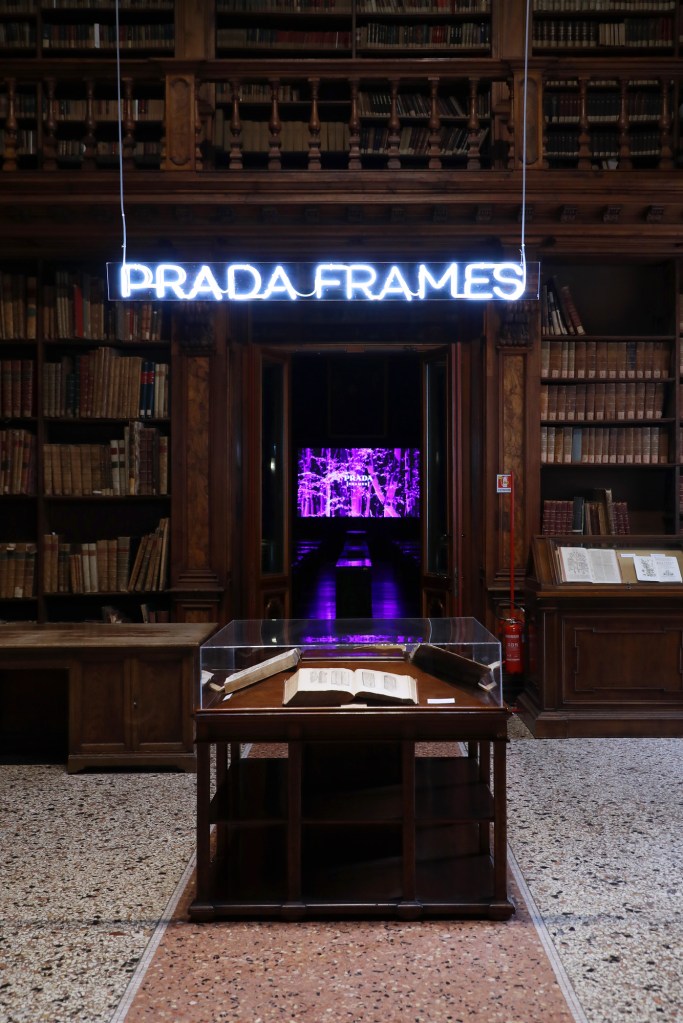MILAN — Prada Frames is going home.
The third iteration of the symposium exploring the complex relationship between the natural environment and design is hitting the private space, becoming even more layered because of that.
Titled “Being Home,” the three-day symposium — conceived by Milan and Rotterdam, Netherlands-based design studio Formafantasma and backed by Prada — is to be held April 14 to 16 at the Museo Bagatti Valsecchi on Milan’s tony Via Gesù in tandem with Salone del Mobile and Milan Design Week, which runs April 16 to 21.
“Being home has nothing to do with being at home, it’s about becoming home because I think houses are big infrastructures, intimate places where people live with their loved ones, which also tackle all the great subjects of modern times, political, social, ecological matters,” said Andrea Trimarchi, one half of the design duo speaking at the Formafantasma headquarters in Milan, itself a studio-cum-home space.
“There is an intellectual dimension, a personal, political and economic dimension to homes,” echoed Farresin echoed. He pointed, for example, to kitchens as an architectural representation of very specific gender politics and policies. “If you think about the role of women, about servitude, social differences. Every domestic space brings about this kind of narrative,” he highlighted.
A similar undercurrent applies to bathrooms, for instance, in spurring conversations on the body and intimacy, as well as the scarcity of resources, namely water.
“The home becomes a magnifying glass on much more complex subjects,” Farresin said, echoing a company statement describing homes as an “evolving, dynamic space where the socioeconomic norms that underpin communities have historically taken shape.”

The 2024 Prada Frames key image.
Courtesy of Prada
The Prada Frames project kicked off in 2022, based on the luxury brand’s and Miuccia Prada’s desire to offer meaningful content during Milan Design Week. The designer and the company’s link with design and architecture, as well as patronage of the arts, is best exemplified by the Fondazione Prada art space, established in 1993, which counts headquarters in Milan and Venice.
The Formafantasma duo said the company has stressed its commitment to the educational component of the project since its inception and they contributed to it by leveraging a multidisciplinary approach, as seen in the panel of speakers from across different fields and industries.
This year’s roster includes, among other names, Kate Crawford, a researcher, writer, composer, producer and academic, who studies the social and political implications of AI; Kersten Geers and David Van Severen, the founders of Brussels, Belgium-based Office, an architectural studio committed to the idea of architecture as a cultural undertaking aimed at improving the human environment; Jack Halberstam, an American academic and author, best known for his book “Female Masculinity” and research practice hinged on feminism and queer and transgender identities in popular culture; Spanish architect Anna Puigjaner, among the founders of Barcelona-based design studio Maio; British design critic and author Alice Rawsthorn, known for her books “Design as an Attitude” and “Hello World: Where Design Meets Life”; Françoise Vergès, a French political scientist, historian and activist focused on postcolonial studies and decolonial feminism; Colombian cultural landscape ecologist Brigitte Baptiste; Paola Antonelli, senior curator, department of architecture and design, and director, research and development at MoMA, as well as actress, model and director Isabella Rossellini.
“We were interested in having professionals from academia, but also [speakers] from different geographical places…different cultures,” Farresin said. “In current times you can hardly really do culture within individual branches of knowledge,” he added.
Panels are organized across the rooms of the stately palazzo — a 19th-century estate with Renaissance-inspired decor and a home until 1974 when it was transformed into a museum. The different conversations happening in the living room, bedroom, dining room, bathroom and library are to be held concurrently at reduced capacity, with less digital and video support compared to previous editions, enhancing the more intimate feel of this year’s topic, the Formafantasma founders explained. Each will be introduced by a preface by Rawsthorn retracing each room’s evolution over time.

Andrea Trimarchi and Simone Farresin, the design duo known as Formafantasma.
Gregorio Gonella/Courtesy of Prada
Trimarchi explained that by working on the schedule they are planning that all sessions end at the same time, with all the palazzo’s doors opening and allowing visitors who have attended different talks to engage in conversations and visit the Museo Bagatti Valsecchgi. “It’s going to be an open house concept,” he explained.
Topics poised to be unpacked at Prada Frames are queer culture; feminism and gender politics in the words of director Anna Kauber traveling through the Italian mountains to unpack the booming phenomenon of female, nomadic shepherds; the dichotomy between the private and public representation of the body; eroticism as seen by Rossellini in her series “Green Porno” centered on the reproductive habits of animal species; the scarcity of residential units, and the displacement of people.
“At a time when the city is overloaded with objects, products and newness, perhaps the most interesting thing is to reflect on that dimension,” Farresin said.
Attendance of Prada Frames is free of charge and based on pre-registrations on the company’s website.
The previous two editions of Prada Frames, held in 2022 and 2023, hinged respectively on the interconnections between the forest ecosystems and the wood industry and how design and science can spur change and on the notion of waste as an ever-evolving material.
Founded in 2009, the award-winning Formafantasma bills itself as a research-based design studio investigating the ecological, historical, political and social forces shaping the discipline of design today. It has worked with several companies across industries including, among others, Flos, Cassina, Bitossi, Bulgari, Hermès, Lexus, Samsung and Maison Matisse.
